REGIONAL
Page 36
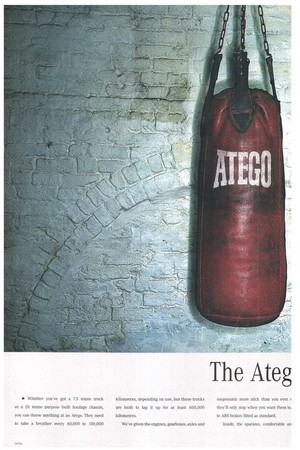
Page 37
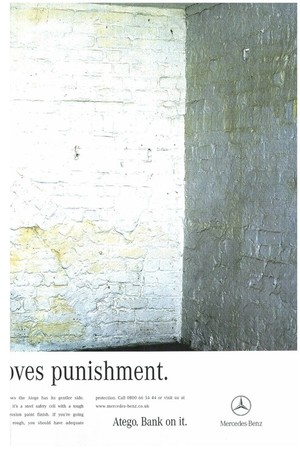
Page 38
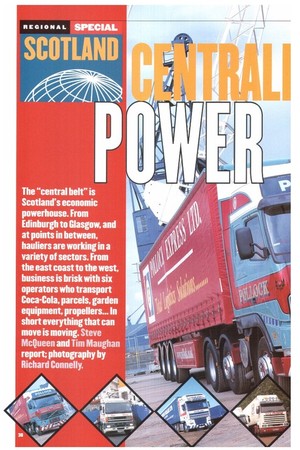
Page 39
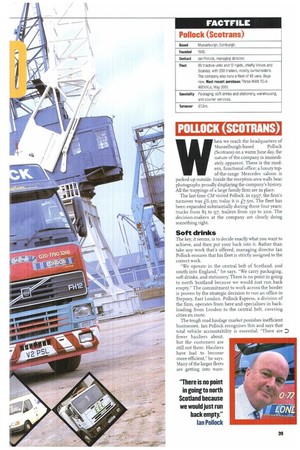
Page 40
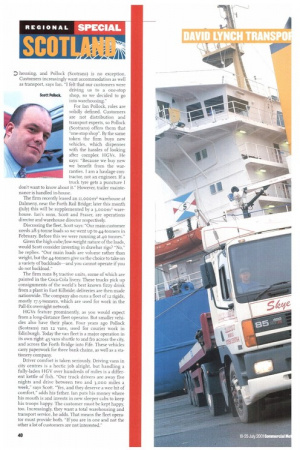
Page 41
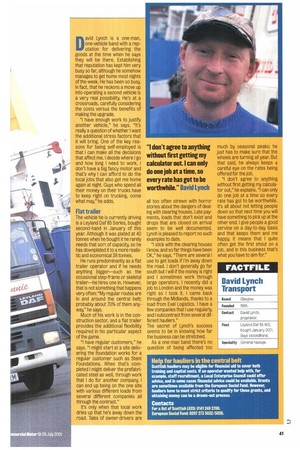
Page 42
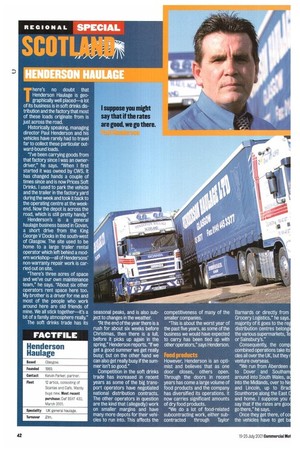
Page 43
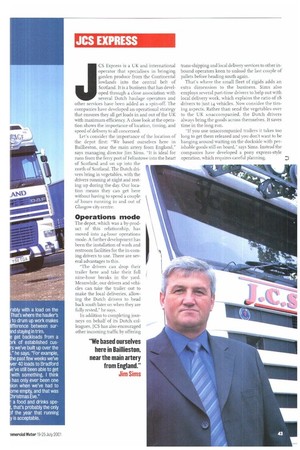
Page 44
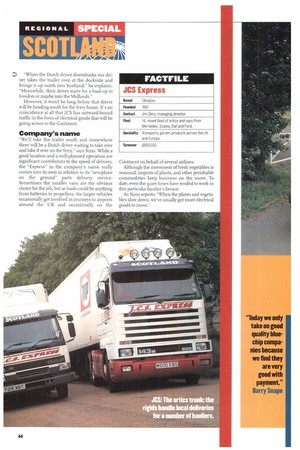
If you've noticed an error in this article please click here to report it so we can fix it.
SPECIAL
The "central belt" is Scotland's economic powerhouse. From Edinburgh to Glasgow, and at points in between, hauliers are working in a variety of sectors. From the east coast to the west, business is brisk with six operators who transport Coca-Cola, parcels, garden equipment, propellers... In short everything that can move is moving. Steve McQueen and Tim Maughan report; photography by Richard Connelly.
Pollock (Scotrans)
Based Musselburgh, Edinburgh.
Founded 1935.
Contact Ian Pollock, managing director.
Fleet 85 tractive units and 12 r4ids, chiefly Volvos and Scanias, with 200 trailers, mostly curtainsiders. The company also runs a fleet of 45 vans. Buys new. Most recent purchase: Three MAN TG-A 460XXLs, May 2001.
Speciality Packaging, soft drinks and stationery, warehousing, and courier services.
Turnover
POLLOCK (SCOTRANS)
VWhen we reach the headquarters of Musselburgh-based Pollock (Scotrans) on a warm June day, the nature of the company is immediately apparent. There is the modern, functional office; a luxury topof-the-range Mercedes saloon is parked up outside. Inside the reception area walls bear photographs proudly displaying the company's history. All the trappings of a large family firm are in place.
The last time CM visited Pollock. in 1997, the firm's turnover was £6.5m; today it is k7.5m. The fleet has been expanded substantially during those four years: trucks from 85 to 97, trailers from 150 to 200. The decision-makers at the company are clearly doing something right.
Soft drinks
The key, it seems, is to decide exactly what you want to achieve, and then put your back into it. Rather than take any work that's offered, managing director Ian Pollock ensures that his fleet is strictly assigned to the correct work.
"We operate in the central belt of Scotland, and south into England," he says. "We carry packaging, soft drinks, and stationery. There is no point in going to north Scotland because we would just run back empty." The commitment to work across the border is proven by the strategic decision to run an office in Stepney, East London. Pollock Express, a division of the firm, operates from here and specialises in backloading from London to the central belt, covering cities en route.
The tough road haulage market punishes inefficient businesses. Ian Pollock recognises this and says that total vehicle accountability is essential: "There are 0 fewer hauliers about, but the customers are still out there. Hauliers have had to become more efficient," he says.
Many of the larger fleets are getting into ware housing, and Pollock (Scotrans) is no exception. Customers increasingly want accommodation as well as transport, says Ian. "I felt that our customers were driving us to a one-stop shop, so we decided to go into warehousing."
For Ian Pollock, roles are solidly defined. Customers are not distribution and transport experts, so Pollock (Scotrans) offers them that "one-stop shop". By the same token the firm buys new vehicles, which dispenses with the hassles of looking after complex HGVs. He says: "Because we buy new we benefit from the warranties. I am a haulage contractor, not an engineer. If a truck tyre gets a puncture I don't want to know about it." However, trailer maintenance is handled in-house.
The firm recently leased an ri,000m2 warehouse at Dalmeny, near the Forth Rail Bridge; later this month (July) this will be supplemented by a 3,000m2 warehouse. Ian's sons, Scott and Fraser, are operations director and warehouse director respectively.
Discussing the fleet, Scott says: "Our main customer needs 28.5-tonne loads so we went up to 44-tonners in February. Before this we were running at 40 tonnes."
Given the high-cube/low-weight nature of the loads, Would Scott consider investing in drawbar rigs? "No," he replies. "Our main loads are volume rather than weight, but the 44-tonners give us the choice to take on a variety of bacIdoads—and you cannot operate if you do not backload."
The firm runs 85 tractive units, some of which are painted in the Coca-Cola livery. These trucks pick up consignments of the world's best known fizzy drink from a plant in East Kilbride; deliveries are then made nationwide. The company also runs a fleet of 12 rigids, mostly 17.5-tonners, which are used for work in the Pall-Ex overnight network.
HGVs feature prominently, as you would expect from a long-distance fleet operator. But smaller vehicles also have their place. Four years ago Pollock (Scotrans) ran 12 vans, used for courier work in Edinburgh. Today the van fleet is a major operation in its own right: 45 vans shuttle to and fro across the city, and across the Forth Bridge into Fife. These vehicles carry paperwork for three bank chains, as well as a stationery company.
Driver comfort is taken seriously. Driving vans in city centres is a hectic job alright, but handling a fully-laden HGV over hundreds of miles is a different kettle of fish. Our truck drivers are away five nights and drive between two and 3,000 miles a week," says Scott. "Yes, and they deserve a wee bit of comfort," adds his father. Ian puts his money where his mouth is and invests in new sleeper cabs to keep his troops happy. The customer must be kept happy, too. Increasingly, they want a total warehousing and transport service, he adds, That means the fleet operator must provide both. "If you are in one and not the other a lot of customers are not interested." Scott Polo&
David Lynch Transport
David Lynch is a one-man, one-vehicle band with a reputation for delivering the goods at the time when he says they will be there. Establishing that reputation has kept him very busy so far, although he somehow manages to get home most nights of the week. He has been so busy, in fact, that he reckons a move up into operating a second vehicle is a very real possibility. He's at a crossroads, carefully considering the costs versus the benefits of making the upgrade.
"I have enough work to justify another vehicle," he says. "It's really a question of whether I want the additional stress factors that
it will bring. One of the key rea sons for being self-employed is
_ .p. that I can make all the decisions to: , and how long I need to work. I
i
to: , and how long I need to work. I don't have a big fancy motor and that's why I can afford to do the local jobs that also get me home again at night. Guys who spend all their money on their trucks have to keep right on trucking, come , / what may," tie adds.
! Flat trailer
' The vehicle he is currently driving
is a Leyland Dal 85 Series, bought second-hand in January of this year. Although it was plated at 40 tonnes when he bought it he rarely needs that sort of capacity, so he has downplated it to a more realistic and economical 38 tonnes.
He runs predominantly as a flat trailer operator and if he needs anything bigger—such as the occasional step-frame or skeletal trailer—he hires one in. However, that is not something that happens very often: "My regular routes are in and around the central belt; probably about 70% of them anyway," he says.
Much of his work is in the construction sector, and a flat trailer provides the additional flexibility required in his particular aspect of the game.
"I have regular customers," he says. "I might start at a site delivering the foundation works for a regular customer such as Stent Foundations. When that's completed I might deliver the prefabricated steel as well, through work that I do for another company. I can end up being on the one site with various different loads from several different companies all through the contract."
It's only when that local work dries up that he's away down the road, Tales of owner-drivers are
all too often strewn with horror stories about the dangers of dealing with clearing houses. Late payments, loads that don't exist and drops that are closed on arrival seem to be well documented. Lynch is pleased to report no such examples to date.
"I stick with the clearing houses I know, and so far things have been OK," he says. "There are several I use to get loads if I'm away down the road. I don't generally go far south but I will if the money is right and I sometimes work through large operators. I recently did a job to London and the money was right so I took it. I came back through the Midlands, thanks to a load from Exel Logistics. I have a few companies that I use regularly, and I subcontract from several different hauliers."
The secret of Lynch's success seems to be in knowing how far the business can be stretched.
As a one-man band there's no question of being affected too much by seasonal peaks; he just has to make sure that the wheels are turning all year. But that said, he always keeps a careful eye on the rates being offered for the job.
"I don't agree to anything without first getting my calculator out," he explains. "I can only do one job at a time so every rate has got to be worthwhile. It's all about not letting people down so that next time you will have something to pick up at the other end. I give people a good service on a day-to-day basis and that keeps them and me happy. It means that I quite often get the first shout on a job, and in this business that's what you have to aim for."
Help for hauliers in the central belt
Scottish haulers may be eligible ter financial aid to cover both training and capital costs. If an operator wanted help with, for example, staff recruitment, a Local Enterprise Council could offer advice, and in some cases financial advice could be available. Grants are sometimes available from the European Social Fund. However, hauliers have to meet strict criteria to qualify for these grants, and obtaining money can be a drawn-out process Contacts
For a list of Scottish LEGS: 0141 248 2700. European Social Fund: 0207 273 5032/5026.
Henderson Haulage There's no doubt that Henderson Haulage is geographically well placed—a lot of its business is in soft drinks distribution and the factory that most of these loads originate from is just across the road.
Historically speaking, managing director Paul Henderson and his vehicles have rarely had to travel far to collect these particular outward-bound loads.
"I've been carrying goods from that factory since I was an ownerdriver," he says, "When I first started it was owned by CWS. It has changed hands a couple of times since and is now Prices Soft Drinks. I used to park the vehicle and the trailer in the factory yard during the week and took it back to the operating centre at the weekend. Now the depot is across the road, which is still pretty handy."
Henderson's is a general haulage business based in Govan, a short drive from the King George V Docks in the south-west of Glasgow. The site used to be home to a large trailer rental operator which left behind a modern workshop—all of Hendersons' non-warranty repair work is carried out on site.
"There's three acres of space and we've our own maintenance team," he says. "About six other operators rent space here too. My brother is a driver for me and most of the people who work around here are old friends of mine. We all stick together—it's a bit of a family atmosphere really."
The soft drinks trade has its seasonal peaks, and is also subject to changes in the weather.
"At the end of the year there is a rush for about six weeks before Christmas, then there is a lull, before it picks up again in the spring," Henderson reports. "If we get a good summer we get really busy; but on the other hand we can also get really busy if the summer isn't so good."
Competition in the soft drinks trade has increased in recent years as some of the big transport operators have negotiated national distribution contracts. The other operators in question are the kind that (allegedly) work on smaller margins and have many more depots for their vehicles to run into. This affects the
competitiveness of many of the smaller companies.
"This is about the worst year of the past five years, as some of the business we would have expected to carry has been tied up with other operators," says Henderson.
Food products
However, Henderson is an optimist and believes that as one door closes, others open. Through the doors in recent years has come a large volume of food products and the company has diversified its operations. It now carries significant amounts of dry food products.
"We do a lot of food-related subcontracting work, either subcontracted through Taylor Barnards or directly from Grocery Logistics," he says. majority of it goes to the re distribution centres belongi the various supermarkets, Te or Sainsbury's."
Consequently, the comp combined operations take its cies all over the UK, but they venture overseas.
"We run from Aberdeen to Dover and Southam around into South Wales, a into the Midlands, over to Ne and Lincoln, up to Brad Scunthorpe along the East and home. I suppose you say that if the rates are goo go there." he says.
Once they get there, of co the vehicles have to get b rably with a load on the That's where the haulier's to drum up work makes ifference between stirnd staying in trim.
get backloads from a rk of established cuss we've built up over the ," he says. "For example, he past few weeks we've ver 40 loads to Bradford eve still been able to get with something. I think has only ever been one ion when we've had to ome empty, and that was hristmas Eve."
a food and drinks spe, that's probably the only f the year that running is acceptable.
JCS EXPRESS
JCS Express is a UK and international operator that specialises in bringing garden produce from the Continental lowlands into the central belt of Scotland. It is a business that has developed through a close association with several Dutch haulage operators and other services have been added as a spin-off. The companies have developed an operational strategy that ensures they all get loads in and out of the UK with maximum efficiency. A close look at the operation shows the importance of location, timing. and speed of delivery to all concerned. Let's consider the importance of the location of the depot first: -We based ourselves here in Baillieston, near the main artery from England," says managing director Jim Sims. It is ideal for runs froin the ferry port of Felixstowe into the heart of Scotland and on up into the north of Scotland. The Dutch drivers bring in vegetables, with the drivers running at night and resting up during the day. Our location means they can get here without having to spend a couple of hours running in and out of Glasgow city centre.
Operations mode
The depot, which was a by-product of this relationship, has moved into 24-hour operati o ns mode. A further development has been the installation of wash and restroom facilities for the in-corning drivers to use. There are several advantages to this.
The drivers can drop their trailer here and take their full nine-hour breaks in the yard. Meanwhile, our drivers and vehicles can take the trailer out tb make the local deliveries, allowing the Dutch drivers to head back south later on when they are fully rested," he says.
In addition to completing journeys on behalf of its Dutch colleagues, ICS has also encouraged other incoming traffic by offering trans-shipping and local delivery services to other inbound operators keen to unload the last couple of pallets before heading south again.
That's where the small fleet of rigids adds an extra dimension to the business. Sims also employs several part-time drivers to help out with local delivery work, which explains the ratio of 18 drivers to just 14 vehicles. Now consider the timing aspects. Rather than send the vegetables over to the UK unaccompanied, the Dutch drivers always bring the goods across themselves. It saves time in the long run.
If you use unaccompanied trailers it takes too long to get them released and you -don't want to be hanging around waiting on the dockside with perishable goods still on board," says Sims. Instead the companies have developed a pony express-style operation, which requires careful planning.
"When the Dutch driver disembarks our driver takes the trailer over at the dockside and brings it up north into Scotland," he explains. "Meanwhile, their driver waits for a load up to London or maybe into the Midlands."
However, it won't be long before that driver will be heading south for the ferry home. Its no coincidence at all that JCS has outward-bound traffic in the form of electrical goods that will be going across to the Continent.
Company's name
"We'll take the trailer south and somewhere there will be a Dutch driver waiting to take over and take it over on the ferry," says Sims. While a good location and a well-planned operation are significant contributors to the speed of delivery, the "Express" in the company's name really comes into its own in relation to its "aeroplane on the ground" parts delivery service. Sometimes the smaller vans are the obvious choice for the job, but as loads could be anything from batteries to propellers, the larger vehicles occasionally get involved in journeys to airports around the UK and occasionally on the Continent on behalf of several airlines.
Although the movement of fresh vegetables is seasonal, imports of plants, and other perishable commodities keep business on the move. To date, even the quiet times have tended to work in this particular haulier's favour: As Sims reports: When the plants and vegetables slow down, we've usually got more electrical goods to move."
Arrow Goldstar
1 arry Snape, regional manager of Arrow Goldstar, spends his work time in an 'ice just a hundred metres or
from the Royal Yacht itannia, which is berthed at ith Docks, Edinburgh. It's not a c location to be in, down near !! water, but Snape can't afford to gaze at the retired ship all day—he has to concentrate on the comings and goings of 27 vans, a motorcycle and two bicycles. Time has taught him that road transport can be a hazardous affair.
The firm started in Edinburgh in 1993. Back then, the work involved putting parcels on buses for dispatch across Scotland. "Inevitably we had to start hiring drivers," says Snape—and three years later the firm was running 20 vans. It was a rapid expansion, but the firm came unstuck when its biggest customer went bust, owing Goldstar Couriers, as the firm was then known, 2,23,000.
"We had bought a lot of vehicles, but our total loss was effectively .E73,000 because we had bought vehicles which we could no longer use," he explains. "At that point we could not exist with the debt we were running."
Luckily for Snape, overnight delivery firm Arrow Express took over the assets of Goldstar Couriers. "I restructured Goldstar Couriers myself, and my partner Bob term and i bought out the other partners," says Snape.
To cut a long story short, today Arrow Goldstar is a subsidiary of Arrow Express, and Goldstar's role is to concentrate on courier work in Scotland. Snape says: "Today we only take on good quality blue-chip companies because we find they are very good with payment."
Solid customers
Nurturing good, solid customers is vital, says Snape because only this can guarantee your cashflow.
A fleet of 27 vans operate from Edinburgh and Dundee, but no vehicles are bought, and Arrow Goldstar does not hire vehicles for long periods. Snape says: "We went through a stage of going through long-term leases; now we have flexi-lease agreements so if we don't need a van there is no cost penalty."
Out of those 27 vans, just five are on lease—the rest are owned by their drivers but bear the livery of Arrow Goldstar.
Twenty one vans operate from Edinburgh; they tend to run within a 25-mile radius of the city. However the vehicles based at Dundee tend to concentrate on delivering to other locations, most notably Perth, Aberdeen, Edinburgh and Glasgow.
"Eighty per cent of the work is with envelopes," Snape tells CM as he gets ready to pose for our photographer by the stormy Firth of Forth. However, he reports that liberalisation of some Royal Mail services is having no effect on Arrow Goldstar: "This will not make any difference to us at all because we are not in the same category—we do same-day, not overnight, work."
Edinburgh is a compact, bustling place—just the right environment for courier firms. Snape is well aware of this fact: "There are around 25 courier firms in Edinburgh, so it is a competitive market," he says. "At the start of the week we know about 60 jobs in advance but the rest of the work is last minute—we pick up the phone and the work is there."
Communication between drivers and the offices is via the Dolphin radio system. In addition to vans the firm fields a motorcycle and two bicycles. Ail drivers and riders are paid by the mile.
Snape does not have to deal with the raft of legislation imposed on operators with larger vehicles: no 0-licence, no pricey VED rates, no tachographs. But the constant ringing of the telephone, and the need to orchestrate things so customers are kept happy, brings its own pressures.
He spent 24 years in the RAF, working in telecommunications, so he knows a bit about efficiency. "But it is harder working in a courier firm," he says.
tilim Docherty, managing director of Bathgate firm Euro Environmental Contracts, has developed his business from scratch to a going concern with a turnover of 15m—in just four years. It is an impressive feat, but Docherty is not yet content: "Over the next three years I have a business plan to take the turnover up to £9m," he says. You don't come across many haulage operations that have expanded at such a meteoric rate, let alone an optimistic operator who is determined to keep expanding rather than simply surviving.
But then Euro Environmental Contracts is not your everyday haulage operation; it is a water jetting and vacuum services company. This is a highly specialist field, but the rewards are substantial for those with the drive and expertise to succeed.
"I used to be a salesman for an industrial high-pressure water jetting company in Glasgow," he says. "I was there for 12 years and then the opportunity arose to set up myself. At the time there was nobody in this sort of business in the south-east of Scotland."
Docherty saw the gap in the market and stepped right in. In 1997 he ran two Ford 26-tonner jet vacuum units.
Expansion quickly followed. He says: "In February 2000 the opportunity arose to buy a industrial jet vac contracting company in Shrewsbury. I did buy it, but I also expanded it."
He also bought a site in Middlesbrough. Docherty has no qualms about spreading his wings, but he believes that you must target your business wisely, rather than taking anything on. For example, he finds that Middlesbrough, bang in the middle of Teesside, one of the most heavily concentrated industrial areas in Europe. is simply too competitive—there are too many water jetting and vacuum service firms competing for every scrap of work.
As a result, he chooses to operate on the periphery of Teesside rather than pushing his operation into the melee of heavy plants and factories. As well as the Middlesbrough, Bathgate, Shrewsbury and Wirral sites, Docherty aims to get a 1.5-acre depot in Andover up and running by the end of the year.
Local authority
Twenty seven of the 50 Euro vehicles are based at the Bathgate depot. "We do local authority drainage in the central belt, but we also go up to the north of Scotland," Docherty reports.
The fleet is certainly varied. "We have 18 jet-vac combination units at Bathgate," he says. These include 13, 17, 18, 26 and 32-tonners. "There are also five lorrymounted jetting units here, as well as four CCTV service units which are used for checking drains," he adds.
This month the company was due to take delivery of two new Iveco Ford 7.5-tonners. "I like lveco
because the aftersales servic good," says Docherty.
He always buys vehicles cash—by doing this, profits be realised later on, he says:" don't get involved in hire purch agreements, which is one of reasons our profit margin is good. Avoiding hire purchas better for the cashflow."
Business is split 60/40 betw local authority and the priv sector, and Docherty has pre gious contracts. He explains:" have a five-year contract British Telecom to clean th underground communication s terns, and we are also contrac to de-scale an aluminium plan the Irish Republic."
Other work is on an ad basis: "Last year Murrayfield flooded so we had to go th and pump up the water. Th was three feet of water in ground, but we did the job aro the clock over two days. At this we spent four weeks m ping the ground up."
There is lot in the pipeline at firm (no pun intended). E Environmental Contracts alre holds the ISO 9002 quality st dard; now the firm is work towards ISO 140001, the cove environmental policy certifica
At the moment we emplo full-time trainer who shows staff how to use the specia machinery," he explains. "By end of this year we plan to take a full-time health and sat expert. I am also planning to b a corporate office which employ 30 to 40 administrati sales and operations staff. company started with no ord
and with over of investme But I had faith in my own ability find the work."
Docherty has found the w but knows very well that the b ness only flourishes because t customers get what they pay f "This work is all about provid service at the right cost."














































































































